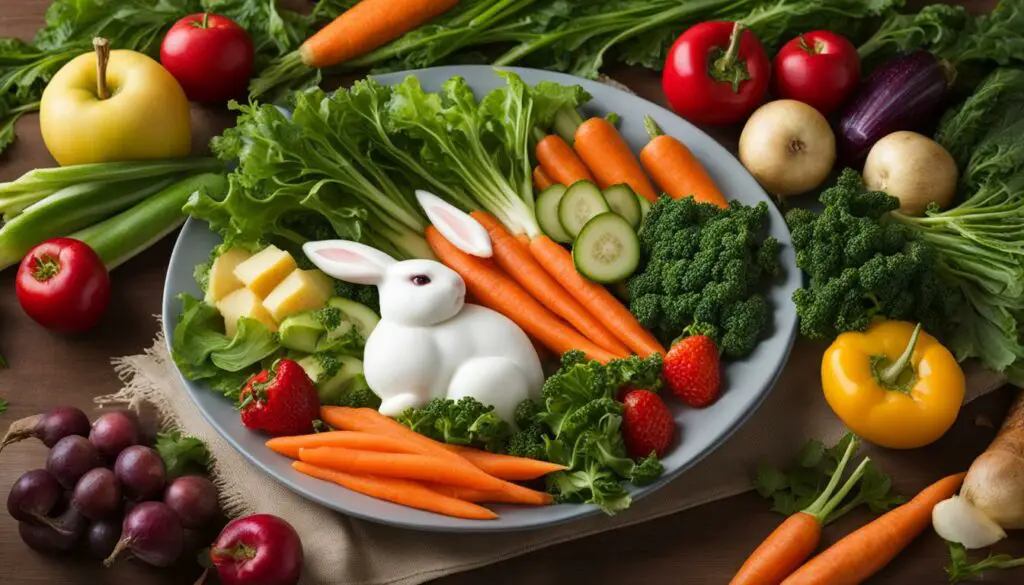When it comes to feeding our furry friends, it’s essential to provide them with a well-rounded and nutritious diet. As rabbit owners, we often wonder if certain foods, like arugula, are safe for our beloved bunnies. In this guide, I will explore the topic of feeding arugula to rabbits and discuss its benefits and considerations.
Rabbits in the wild have a diverse diet that includes a variety of plants, and as pet owners, we should strive to replicate this natural diet as closely as possible. When it comes to leafy greens, arugula is a popular choice among rabbit owners. But can rabbits have arugula?
The answer is yes, rabbits can have arugula, but it should be given in moderation and as part of a well-rounded diet. Arugula is considered a rabbit-safe green and can be included in a rabbit’s nutrition plan. However, it’s important to remember that arugula should not be the sole component of a rabbit’s diet and should be complemented with other leafy greens, hay, vegetables, and fruits.
Arugula offers several benefits for rabbits. It is rich in vitamins, including Vitamin A and Vitamin C, which are essential for a strong immune system. The peppery taste of arugula provides variety and enrichment in a rabbit’s diet, making mealtime more enjoyable for them.
While arugula is safe for rabbits, there are precautions to consider. Arugula contains oxalic acid, which can contribute to the formation of kidney stones and bladder sludge when consumed excessively. It’s crucial to regulate the amount of arugula given to rabbits and avoid combining it with other high oxalate foods. Additionally, rabbits should have a balanced diet that includes a variety of hay, leafy greens, non-leafy vegetables, and fruits to meet their nutritional needs.
Key Takeaways:
- Arugula can be safely included in a rabbit’s diet, but it should be given in moderation.
- Arugula provides several health benefits for rabbits, including essential vitamins and minerals.
- It’s important to monitor the serving size of arugula and avoid combining it with other high oxalate foods.
- Rabbits should have a diverse diet that includes hay, leafy greens, non-leafy vegetables, and fruits.
- As responsible pet owners, we should always prioritize the overall health and well-being of our rabbits.
The Importance of a Balanced Diet for Rabbits
A balanced diet is crucial for the health and well-being of rabbits. Just like humans, rabbits have specific dietary needs that must be met to ensure optimal health. A balanced diet for rabbits should include a variety of nutrients, including carbohydrates, protein, fiber, vitamins, and minerals.
Hay should be the primary component of a rabbit’s diet, providing essential nutrients like Vitamin A, Vitamin D, calcium, and protein. Fresh foods, such as leafy greens, should also be included to provide additional vitamins and moisture to support kidney and bladder function.
Offering a varied diet that includes arugula and other rabbit-safe greens ensures that rabbits receive a range of vitamins and minerals necessary for their overall well-being. It’s important to remember that moderation is key when it comes to feeding arugula to rabbits, as excessive intake of calcium and oxalic acid can lead to urinary problems. By providing a balanced and diverse diet, rabbit owners can help their furry friends thrive and lead healthy lives.

| Nutrient | Role | Sources |
|---|---|---|
| Carbohydrates | Provide energy | Hay, pellets, vegetables, fruits |
| Protein | Support growth and repair | Hay, pellets, leafy greens, seeds |
| Fiber | Promote healthy digestion | Hay, leafy greens, vegetables |
| Vitamins | Support various bodily functions | Leafy greens, carrots, fruits |
| Minerals | Essential for bone health and overall well-being | Hay, leafy greens, vegetables |
Table: Essential nutrients for rabbits and their food sources.
By providing a balanced diet that meets the nutritional requirements of rabbits, pet owners can help ensure the long-term health and well-being of their furry companions. It is also important to monitor their health and behavior regularly, making adjustments to their diet as needed.
Introducing Arugula to Rabbits
When it comes to introducing arugula to rabbits, it’s important to do so gradually and in moderation. Arugula can be a tasty addition to a rabbit’s diet, but it should not be the main component. Start by offering a small amount, such as an eighth of a cup, and observe how your rabbit responds. If there are no adverse reactions, you can gradually increase the serving size.
The recommended serving size for arugula is no more than two large leaves per meal, two to three times a week. This ensures that your rabbit receives the nutritional benefits of arugula without overloading their system. Keep in mind that every rabbit is unique, so it’s essential to monitor your rabbit for any signs of bloating, diarrhea, or lethargy. Adjust the amount of arugula accordingly to maintain their digestive health.

Incorporating arugula into your rabbit’s diet provides them with variety and enrichment. The peppery taste of arugula can add a different flavor profile to their meals, making mealtime more exciting for them. However, it’s important to remember that arugula should always be part of a balanced diet that includes hay, leafy greens, non-leafy vegetables, and fruits.
By introducing arugula to your rabbit’s diet correctly and in moderation, you can provide them with a diverse range of nutrients and flavors. Always prioritize their overall health and well-being by monitoring their response to new foods and adjusting their diet as needed.
The Health Benefits of Arugula for Rabbits
Arugula is a nutritious vegetable that offers several health benefits for rabbits. It contains a range of essential nutrients, including vitamins and minerals, that contribute to their overall well-being. Here are some of the key health benefits of arugula for rabbits:
Vitamins:
Arugula is rich in vitamins, particularly Vitamin C and Vitamin A. Vitamin C is essential for a strong immune system, helping rabbits fight off infections and diseases. Vitamin A plays a crucial role in maintaining healthy skin, fur, and vision. By incorporating arugula into their diet, rabbits can receive these vital vitamins to support their overall health.
Minerals:
Arugula is also a good source of minerals that are necessary for rabbits’ well-being. It contains potassium, calcium, and magnesium, which contribute to bone health, nerve function, and muscle contraction. These minerals are essential for rabbits to maintain strong skeletal systems and optimal bodily functions.
Dietary Fiber:
Like other leafy greens, arugula is high in dietary fiber. Fiber plays a crucial role in maintaining healthy digestion and preventing gastrointestinal issues in rabbits. It helps promote regular bowel movements and reduces the risk of conditions like gastrointestinal stasis. By including arugula in a well-rounded diet, rabbits can benefit from the fiber content and maintain a healthy digestive system.
It’s important to note that while arugula offers these health benefits, it should be given in moderation as part of a balanced diet. Too much arugula can contribute to urinary problems due to its oxalic acid and calcium content. Therefore, it’s essential to follow recommended serving sizes and monitor rabbits for any signs of urinary issues. By incorporating arugula into their diet carefully, rabbits can enjoy its health benefits and dietary variety.
| Health Benefits | Nutrients |
|---|---|
| Vitamins (Vitamin C and Vitamin A) | Boosts immune system, supports healthy skin and fur, promotes good vision |
| Minerals (Potassium, Calcium, Magnesium) | Supports bone health, nerve function, and muscle contraction |
| Dietary Fiber | Helps maintain a healthy digestive system and prevents gastrointestinal issues |
Precautions When Feeding Arugula to Rabbits
Feeding arugula to rabbits can provide them with a nutritious addition to their diet. However, it’s important to take certain precautions to ensure their well-being. Arugula contains oxalic acid, which can contribute to the formation of kidney stones and bladder sludge when consumed in large quantities. Additionally, arugula contains calcium, which can further contribute to urinary issues if over-consumed.
To prevent these problems, it’s crucial to regulate the amount of arugula given to rabbits and avoid combining it with other high oxalate foods like parsley, mustard greens, and spinach. It’s recommended to follow the recommended serving size, which is two large leaves per meal, two to three times a week. By monitoring the rabbit’s health and adjusting the amount of arugula accordingly, you can help prevent any potential urinary problems.
In addition to regulating the serving size, it’s also important to ensure the freshness of the arugula. Wilting or spoiled arugula can be harmful to rabbits, so always clean it thoroughly before serving. When sourcing arugula, choose trusted sources, and if possible, opt for organic arugula to minimize the risk of pesticide contamination.
| Precautions when Feeding Arugula to Rabbits | Recommendations |
|---|---|
| Oxalic Acid | Regulate the amount of arugula given to rabbits to prevent the formation of kidney stones and bladder sludge. |
| Calcium | Avoid overconsumption of arugula and other high calcium foods to prevent urinary issues. |
| Serving Size | Follow the recommended serving size of two large leaves per meal, two to three times a week. |
| Freshness | Ensure the arugula is fresh and free from wilting or spoilage. |
| Source | Choose trusted sources for arugula, preferably organic to minimize pesticide contamination. |
By taking these precautions when feeding arugula to rabbits, you can safely incorporate this nutritious vegetable into their diet and promote their overall health and well-being.
Feeding Arugula to Baby and Juvenile Rabbits
When it comes to feeding arugula to baby and juvenile rabbits, it’s important to exercise caution due to their sensitive digestive systems. Arugula should not be introduced into their diet until they reach maturity, around four months of age. During this early stage, their main source of nutrition should be grass hay and grass, which provide the necessary fiber and nutrients for their growth and development. Arugula and other leafy vegetables can be too rich for their delicate systems, potentially causing digestive issues.
By focusing on a diet primarily composed of hay and grass, you can provide the essential nutrition that baby and juvenile rabbits need. As they mature and their digestive systems become more robust, arugula can be gradually introduced into their diet. It is essential to monitor their response and adjust the serving size accordingly to ensure they tolerate it well.
Remember, every rabbit is unique, and what works for one may not work for another. It’s crucial to consult with a veterinarian who specializes in rabbit care to make informed decisions about your pet’s diet. They can provide guidance on when to introduce arugula and other leafy greens and help monitor your rabbit’s overall health and development.

| Age | Dietary Recommendations |
|---|---|
| Under 4 months | Focus on grass hay and grass. Avoid arugula and other leafy vegetables. |
| 4 months and older | Introduce arugula gradually, monitoring for any adverse reactions. Adjust the serving size based on individual tolerance. |
Key Points:
- Arugula should not be fed to baby and juvenile rabbits until they reach maturity.
- Focus on a diet primarily composed of grass hay and grass for their essential nutrition.
- Consult with a veterinarian who specializes in rabbit care for personalized guidance.
Serving Arugula to Mature Rabbits
When it comes to serving arugula to mature rabbits, moderation is key. While arugula can be a safe and nutritious addition to their diet, it should be given in appropriate amounts. The recommended serving size for mature rabbits is two large leaves per meal, two to three times a week. This serving size provides them with the benefits of arugula without exposing them to excessive calcium and oxalic acid intake, which can lead to urinary problems.
It’s important to adjust the serving size based on the rabbit’s size and individual dietary needs. Some rabbits may require more or less arugula depending on factors such as their activity level and overall health. Pay attention to your rabbit’s body condition and behavior to ensure that they are thriving on their diet.
Remember that arugula should be just one component of a balanced and diverse diet for rabbits. Along with arugula, include other rabbit-safe leafy greens, non-leafy vegetables, hay, and a small amount of fruits to provide a variety of nutrients and flavors. Offering a varied diet not only ensures their nutritional needs are met but also adds enrichment to their meals, making it more enjoyable for them.

Table: Serving Size Guide for Mature Rabbits
| Arugula Serving Size | Meal Frequency |
|---|---|
| 2 large leaves | 2-3 times a week |
Table: Components of a Balanced Diet for Mature Rabbits
| Nutritional Component | Percentage of Diet |
|---|---|
| Hay (grass hay) | 70-80% |
| Leafy Greens (including arugula) | 15-25% |
| Non-leafy Vegetables | 5-10% |
| Fruits | Up to 5% |
Other Vegetables for Rabbits
Aside from arugula, there are numerous other vegetables that are safe and beneficial for rabbits to consume. Incorporating a variety of vegetables into a rabbit’s diet ensures they receive a range of nutrients and flavors, promoting optimal health and well-being. Some rabbit-safe vegetables and leafy greens include:
- Parsley
- Kale
- Romaine lettuce
- Dandelion greens
- Carrot tops
These leafy greens offer essential vitamins and minerals that support various bodily functions. Non-leafy vegetables like carrots, broccoli, celery, and bell peppers can also be included in a rabbit’s diet, but in limited quantities. These vegetables provide additional nutrients and add variety to their meals.
“Offering a diverse range of vegetables helps ensure rabbits receive a balanced diet and enjoy their meals. It’s important to introduce new vegetables slowly and observe how rabbits react to them.”
Remember to wash all vegetables thoroughly before serving them to rabbits to remove any dirt or chemicals. Providing a varied diet not only meets rabbits’ nutritional needs but also keeps them mentally stimulated and satisfied.
| Variety of Vegetables for Rabbits | Recommended Serving | Nutritional Benefits |
|---|---|---|
| Parsley | Small bunch | Rich in vitamin C and calcium |
| Kale | 1-2 leaves | High in vitamin A, vitamin C, and calcium |
| Romaine Lettuce | 1-2 leaves | Good source of folate and fiber |
| Dandelion Greens | Small bunch | Rich in vitamins A, C, and K, as well as calcium |
| Carrot Tops | Small bunch | Contain vitamin K, potassium, and antioxidants |

Offering a variety of vegetables in a rabbit’s diet helps ensure they receive a well-rounded nutritional intake. However, it’s important to remember that vegetables should only make up a portion of their overall diet. Hay should be the primary component, followed by fresh leafy greens and a smaller amount of non-leafy vegetables. By providing a balanced and diverse diet, you can help support your rabbit’s overall health and happiness.
Importance of Grass Hay in a Rabbit’s Diet
When it comes to a rabbit’s diet, grass hay plays a crucial role in ensuring their overall health and well-being. Not only does hay provide essential nutrients like Vitamin A, Vitamin D, calcium, and protein, but it also promotes dental health. Rabbits have continuously growing teeth, and gnawing on hay helps wear down their teeth naturally, preventing dental problems that can arise from overgrown teeth.
Hay also plays a vital role in maintaining a healthy gastrointestinal system for rabbits. The high fiber content in hay helps regulate their digestion, prevent hairballs, and prevent gastrointestinal stasis, a condition that can be life-threatening for rabbits. By including hay as the primary component of their diet, you are providing them with the necessary fiber to keep their digestive system functioning optimally.
“Hay is not just a food source for rabbits; it’s a vital part of their daily routine and essential for their overall well-being.”
When selecting hay for your rabbit, opt for varieties such as timothy, orchard, or oat hay. These types of grass hay are readily available and provide the necessary nutrition for your furry friend. Make sure to offer hay to your rabbit at all times, ensuring they have a constant supply to munch on throughout the day. It’s best to choose high-quality hay that is free from dust, mold, and other contaminants to safeguard your rabbit’s health.
| Benefits of Grass Hay for Rabbits |
|---|
| Provides essential nutrients like Vitamin A, Vitamin D, calcium, and protein |
| Promotes dental health by naturally wearing down rabbits’ continuously growing teeth |
| Regulates digestion, prevents hairballs, and helps prevent gastrointestinal stasis |
| Offers a constant source of fiber for a healthy gastrointestinal system |
In conclusion, grass hay is an essential component of a rabbit’s diet. By providing your rabbit with a constant supply of hay, you are ensuring their nutritional needs are met, promoting healthy teeth and gastrointestinal function. Remember to always choose high-quality hay and offer it to your rabbit alongside a varied selection of fresh leafy greens, vegetables, and fruits to provide a well-rounded diet for their optimal health and well-being.

Monitoring Rabbit’s Health and Adjusting Diet

When it comes to ensuring the well-being and overall health of our rabbits, ongoing monitoring and adjustments to their diet are crucial. As responsible pet owners, we should always be attentive to any changes in their behavior, appetite, or physical condition. By closely observing their health and assessing their diet, we can make informed decisions to optimize their nutrition and address any potential issues that may arise.
To monitor rabbit’s health, it’s essential to regularly check for any signs of urinary problems, such as difficulty urinating or blood in the urine. These can indicate issues related to diet, including the consumption of arugula or other factors. Additionally, any changes in appetite, energy levels, bowel movements, or overall demeanor should be noted and evaluated. By being vigilant and proactive, we can promptly identify and address any potential health concerns.
When assessing a rabbit’s diet, it’s important to ensure they are receiving a balanced and appropriate mix of hay, fresh leafy greens, non-leafy vegetables, and fruits. Regularly review the serving sizes and frequencies of each food group to ensure the rabbit’s nutritional needs are being met. If necessary, adjustments can be made to increase or decrease certain components of their diet based on their individual requirements. For example, if a rabbit is experiencing digestive issues or weight fluctuations, reducing the serving size of arugula and increasing the amount of hay may be beneficial.
By closely monitoring a rabbit’s health and assessing their diet regularly, we can make informed decisions and adjustments to optimize their overall well-being. Remember, every rabbit is unique, and their dietary needs may vary. Consulting with a veterinarian who specializes in rabbits can provide valuable guidance and ensure that your furry friend receives the best possible care.
Providing a Varied Diet for Optimal Health
Offering a diversified diet is crucial for ensuring the optimal health of rabbits. A varied diet provides rabbits with a wide range of nutrients, flavors, and textures, which promotes their overall well-being. Including a variety of hay, leafy greens, non-leafy vegetables, and fruits in appropriate quantities ensures that rabbits receive a balanced and nutritionally rich diet.
There are several benefits to providing a diversified diet for rabbits. Firstly, it helps prevent boredom and encourages natural foraging behaviors. Rabbits thrive on variety, and different foods offer different tastes and textures, providing mental and physical stimulation.
Moreover, a varied diet allows rabbits to obtain a wide range of essential nutrients. Each type of food has its own unique nutritional profile, and by offering a diverse selection, rabbits can meet their dietary requirements more effectively. This helps support their immune system, digestive health, and overall vitality.
The Importance of Variety
“A varied diet ensures that rabbits receive a wide range of nutrients to support their overall well-being.”
By providing a varied diet, you can also help prevent selective eating habits, where rabbits may only consume their favorite foods and ignore others. This ensures that they receive a balanced intake of all necessary nutrients, reducing the risk of deficiencies. It is important to note, however, that any new food introduced to a rabbit’s diet should be done gradually, as sudden changes can upset their digestive system.
In summary, a varied diet is essential for rabbits’ optimal health. It provides mental and physical stimulation, supports their immune and digestive systems, and helps prevent selective eating habits. By offering a diverse range of hay, leafy greens, non-leafy vegetables, and fruits, you can ensure that your rabbits receive a nutritionally balanced and enjoyable diet.
| Benefits of a Varied Diet for Rabbits |
|---|
| Prevents boredom and encourages natural foraging behaviors |
| Provides a wide range of essential nutrients |
| Supports immune system and digestive health |
| Reduces the risk of selective eating habits |
Safely Sourcing Arugula for Rabbits
When it comes to sourcing arugula for your rabbits, it’s essential to prioritize their health and well-being. Choosing trusted sources ensures that the arugula is safe for consumption and free from potential contaminants. One option is to opt for organic arugula, which reduces the risk of pesticide contamination. Organic farming practices prioritize the use of natural fertilizers and pest control methods, creating a safer product for your rabbits.
If you have access to a garden, consider growing your own arugula. Growing your own ensures that you have full control over the cultivation process, and you can be confident that the arugula is free from commercial fertilizers and pesticides. Plus, it can be a fun and rewarding activity to engage in with your rabbits. Just make sure to clean the arugula thoroughly before serving it to your furry friends to remove any dirt or chemicals.

Regardless of whether you purchase arugula or harvest it from your garden, freshness is key. Wilted or spoiled arugula can be harmful to rabbits and may cause digestive issues. Always inspect the arugula before feeding it to your rabbits, discarding any leaves that appear unhealthy. By sourcing arugula from trusted sources and ensuring its freshness, you can provide your rabbits with a safe and nutritious addition to their diet.
Table: Comparing Different Sources of Arugula for Rabbits
| Source | Advantages | Considerations |
|---|---|---|
| Organic Arugula | – Reduced risk of pesticide contamination – Safer for rabbit consumption |
– May be more expensive – Availability may vary |
| Homegrown Arugula | – Full control over cultivation process – Free from commercial fertilizers and pesticides |
– Requires time and effort to grow – Limited availability depending on gardening skills and space |
| Purchased Arugula | – Convenient and readily available | – Quality and sourcing may vary – Requires careful inspection for freshness |
By considering these options and taking the necessary precautions, you can ensure that the arugula you provide to your rabbits is sourced safely and contributes to their overall health and well-being. Remember to introduce arugula gradually and monitor your rabbits’ response to ensure they can comfortably enjoy this nutritious green.
Arugula as an Enrichment and Treat for Rabbits
Arugula can be a fantastic addition to a rabbit’s diet, not only for its nutritional benefits but also for its ability to provide enrichment and serve as a tasty treat. Rabbits enjoy a diverse range of flavors and textures, and incorporating arugula into their meals can offer a welcomed change of pace.
As an enrichment tool, arugula stimulates rabbits’ senses with its unique peppery taste. It keeps their meals interesting and exciting, preventing boredom and encouraging natural foraging behaviors. Hand-feeding your rabbit small pieces of arugula can also be a great bonding experience, deepening the connection between you and your furry friend.
“Introducing new foods, such as arugula, can provide rabbits with mental and sensory stimulation while promoting a healthy relationship with food.”
However, it’s important to remember that arugula should be given in moderation, alongside a balanced and varied diet. While rabbits may adore the taste of arugula, it should not exceed the recommended serving size to avoid potential health issues. Always prioritize the primary components of a rabbit’s diet, such as hay and leafy greens, and use arugula as an occasional enrichment and treat.

Benefits of Arugula as an Enrichment and Treat
| Benefits | Description |
|---|---|
| Variety and Stimulation | Arugula offers a different taste and texture to rabbits, enhancing their mealtime experience and preventing dietary monotony. |
| Foraging Behaviors | Introducing new foods, such as arugula, can provide rabbits with mental and sensory stimulation while promoting a healthy relationship with food. |
| Bonding Opportunity | Hand-feeding arugula allows you to interact with your rabbit, strengthening the bond between you and creating positive associations with food. |
Remember to always consult with a veterinarian to ensure that arugula and other dietary changes are appropriate for your individual rabbit, as their specific needs may vary.
By incorporating arugula into your rabbit’s diet as an enrichment tool and occasional treat, you can provide them with a stimulating and enjoyable mealtime experience.
Other Considerations When Feeding Arugula to Rabbits
When it comes to feeding arugula to rabbits, there are a few important considerations to keep in mind. One such consideration is the potential for allergic reactions. While arugula is generally safe for rabbits, some individuals may have sensitivities or allergies to this vegetable. It’s important to observe your rabbit closely after introducing arugula into their diet and look for any signs of discomfort or adverse reactions. If you notice any unusual symptoms, such as itching, sneezing, or changes in behavior, it may be best to discontinue feeding arugula and consult with a veterinarian.
Another consideration when feeding arugula to rabbits is the freshness of the vegetable. Wilted or spoiled arugula can be harmful to rabbits and may lead to digestive issues. Whether you purchase arugula from a store or harvest it from your garden, ensure that it is clean and free from any chemicals or pesticides. Thoroughly wash the arugula before serving it to your rabbits to remove any dirt or potential contaminants.
In conclusion, while arugula can be a safe and nutritious addition to a rabbit’s diet, it’s important to be mindful of any potential allergies or sensitivities. Additionally, always ensure that the arugula is fresh and free from any harmful substances. By taking these considerations into account, you can provide your rabbits with a well-rounded and balanced diet that includes the benefits of arugula.

Summary:
- Some rabbits may have allergies or sensitivities to arugula, so it’s important to monitor their reaction.
- Ensure that the arugula is fresh and free from any chemicals or pesticides.
- Thoroughly wash the arugula before serving it to your rabbits.
Conclusion on Feeding Arugula to Rabbits
After exploring the topic of feeding arugula to rabbits, it is evident that arugula can be a safe and beneficial addition to their diet. Arugula provides essential nutrients, variety, and enrichment for rabbits. However, it’s crucial to introduce arugula gradually and observe for any adverse reactions. It is also important to regulate the serving size to prevent urinary problems caused by excessive calcium and oxalic acid intake.
When incorporating arugula into a rabbit’s diet, it is essential to ensure a balanced and diversified food plan. Hay, including grass hay like timothy, orchard, and oat hay, should make up the majority of a rabbit’s diet. Fresh leafy greens, non-leafy vegetables, and fruits should also be included in appropriate quantities to provide a wide range of nutrients.
Remember to source arugula from trusted sources, preferably organic, to reduce the risk of pesticide contamination. Always clean the arugula thoroughly before serving it to rabbits to remove any dirt or chemicals. Additionally, be mindful of any allergic reactions or wilted arugula, as these can be harmful to rabbits.
In conclusion, arugula can be a valuable addition to a rabbit’s diet when provided in moderation and as part of a well-rounded meal plan. By following the guidelines for introducing arugula and monitoring a rabbit’s health, you can ensure their overall well-being and provide them with a variety of flavors and nutrients.
FAQ
Can rabbits eat arugula?
Yes, rabbits can eat arugula in moderation as part of a well-rounded diet.
What should be the primary component of a rabbit’s diet?
The primary component of a rabbit’s diet should be grass hay, such as timothy, orchard, oat hay, or brome.
How much arugula should I feed my rabbit?
The recommended serving size of arugula for rabbits is two large leaves per meal, two to three times a week.
What are the health benefits of arugula for rabbits?
Arugula provides essential vitamins and minerals like Vitamin C, Vitamin A, potassium, calcium, and magnesium, supporting a strong immune system and bone health.
Are there any precautions when feeding arugula to rabbits?
Yes, arugula should be given in moderation to prevent urinary problems caused by excessive calcium and oxalic acid intake.
Can baby rabbits eat arugula?
No, baby rabbits under four months of age should not be fed arugula or any other leafy vegetables.
How should arugula be served to mature rabbits?
Arugula should be served gradually, starting with a small amount and increasing the serving size to no more than two large leaves per meal, two to three times a week.
What other vegetables can rabbits eat besides arugula?
Rabbits can also eat leafy greens like parsley, kale, romaine lettuce, and dandelion greens, as well as non-leafy vegetables like carrots, broccoli, celery, and bell peppers in limited quantities.
Why is grass hay important in a rabbit’s diet?
Grass hay provides essential nutrients like Vitamin A, Vitamin D, calcium, and protein, promotes healthy teeth and gastrointestinal health.
How should I monitor my rabbit’s health and adjust its diet?
Regularly check for signs of urinary problems, changes in appetite, energy, or bowel movements, and adjust the diet accordingly to ensure your rabbit’s overall well-being.
Why is it important to provide a varied diet for rabbits?
A varied diet ensures that rabbits receive a range of nutrients and flavors to support their optimal health.
How should I source arugula for rabbits?
Choose trusted sources and prefer organic arugula to reduce the risk of pesticide contamination.
Can arugula be given to rabbits as an enrichment and treat?
Yes, arugula can serve as both an enrichment and a treat, providing variety and stimulation in a rabbit’s diet.
Are there any other considerations when feeding arugula to rabbits?
Yes, some rabbits may be allergic to arugula, and it’s important to serve fresh arugula and avoid wilted or spoiled leaves.








